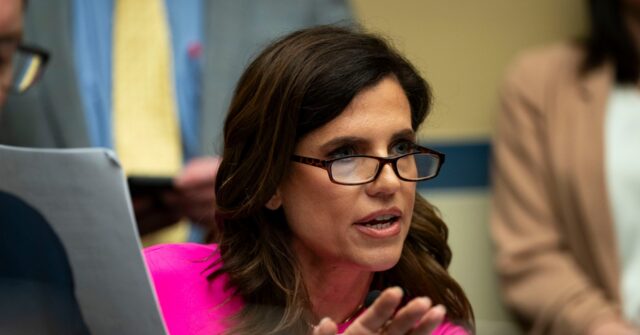Rep. Nancy Mace (R-SC) has emerged as a vocal advocate for legislation that would restrict access to women’s facilities in the U.S. Capitol based on biological sex. This initiative comes in light of the anticipated arrival of transgender Rep.-elect Sarah McBride (D-Del.), a transgender woman, in Congress. Mace is staunchly opposed to the idea of biological men using women’s restrooms and locker rooms, asserting that such actions do not align with principles of dignity and respect for women. In her view, allowing biological men into women’s private spaces compromises the safety and privacy that women deserve.
During an exchange with an ABC reporter, Mace expressed her unwavering stance on the issue, stating that she will not permit biological men to invade women’s spaces. She emphasized her personal background as a survivor of sexual abuse, which has intensified her resolve on the matter. Mace characterized her position as a protective measure for women, asserting that the presence of biological men in spaces traditionally designated for women is unacceptable. She condemned the notion with forceful language, explaining that she is prepared to take action—including a privileged motion to secure a vote—if her concerns are ignored in the legislative process.
The dialogue surrounding her proposed legislation and its implications has intensified, especially regarding how it contrasts with the more inclusive perspectives held by some of her colleagues. When refuting claims about dignity and respect from Speaker Mike Johnson (R-LA), Mace argued that requiring women to share facilities with men is the antithesis of both. She firmly believes that the safety and sanctity of women’s spaces must be prioritized over political correctness or the rights of transgender individuals in this context. Her comments reflect a significant divide within Congress on the issue of gender identity and the rights of transgender individuals compared to the rights of biological women.
Mace’s proposed bill seeks to codify the right of members and employees of the House to access only those single-sex facilities that correlate with their biological sex. This legislative move has sparked considerable discussion regarding the treatment of transgender individuals within government institutions. Speaker Johnson, who has indicated potential support for Mace’s initiative in private settings, publicly called for respectful treatment of all representatives while avoiding definitive statements on McBride’s gender. This approach illustrates the challenges faced by leadership in addressing conflicting views on gender and inclusion.
The ongoing debate has raised questions regarding the balance between gender identity rights and the rights of women to secure their private spaces. Mace’s remarks not only reflect her strong personal convictions but also resonate with a segment of the public who shares her concerns. The situation exemplifies the ongoing societal struggle to reconcile differing beliefs about gender and safety, particularly in environments that are supposed to be inclusive. The clash of perspectives indicates that these discussions will persist as new legislation is introduced and the policies surrounding gender identity continue to evolve.
In summary, Rep. Nancy Mace’s advocacy for a bill limiting access to women’s facilities based on biological sex positions her firmly against what she perceives as threats to women’s privacy and safety. Her impassioned defense of the proposed legislation underscores a broader culture clash within Congress and society at large regarding issues of gender identity and inclusion. With support from certain GOP leaders and vocal opposition from progressive factions, the discourse surrounding this issue is poised to be a significant battleground as lawmakers debate both the intent and implications of such legislative efforts in the context of an increasingly complex conversation about gender rights.

